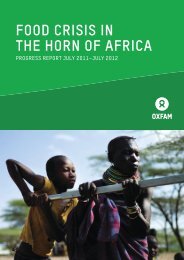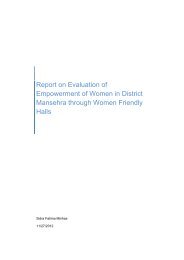No Time to Lose - Oxfam
No Time to Lose - Oxfam
No Time to Lose - Oxfam
You also want an ePaper? Increase the reach of your titles
YUMPU automatically turns print PDFs into web optimized ePapers that Google loves.
Legal Responsibilities of Supporting<br />
States<br />
Under International Law<br />
All parties <strong>to</strong> the conflict in Afghanistan are bound by the rules of international<br />
humanitarian law applicable in non-international armed<br />
conflict. These include: the obligation <strong>to</strong> distinguish between civilians<br />
and combatants and <strong>to</strong> direct attacks only at combatants; the prohibition<br />
of attacks expected <strong>to</strong> cause disproportionate civilian harm; and<br />
the requirement that in the conduct of military operations, all feasible<br />
precautions be taken <strong>to</strong> minimise civilian harm. 79 Parties <strong>to</strong> the conflict<br />
are required <strong>to</strong> ensure special respect and protection for children,<br />
meaning in particular that sexual abuse and the recruitment of children<br />
in<strong>to</strong> the armed forces are prohibited, and <strong>to</strong> respect the specific<br />
protection needs of women. 80 Murder, cruel or inhumane treatment,<br />
sexual violence and arbitrary detention are also violations of international<br />
humanitarian law. 81<br />
The ANSF also have obligations under international human rights<br />
law, including the obligation <strong>to</strong> respect and ensure respect for the<br />
right <strong>to</strong> life, <strong>to</strong> freedom from <strong>to</strong>rture and other cruel, inhuman or degrading<br />
treatment or punishment, and <strong>to</strong> freedom from arbitrary arrest<br />
or detention. 82<br />
While primary responsibility for the protection of Afghan citizens<br />
rests with the GIRoA, under article one common <strong>to</strong> the four Geneva<br />
Conventions, all states also have a duty <strong>to</strong> ensure respect for international<br />
humanitarian law. As interpreted by the International Committee<br />
of the Red Cross (ICRC), this entails an obligation on the part of<br />
states <strong>to</strong> ‘exert their influence, <strong>to</strong> the degree possible, <strong>to</strong> s<strong>to</strong>p violations’<br />
of international humanitarian law. 83 The ICRC advises that in<br />
fulfilment of this obligation, in the conduct of military operations<br />
states should ensure that international humanitarian law is ‘translated<br />
in<strong>to</strong> measures and mechanisms’ at both the doctrinal and procedural<br />
level; that armed forces personnel are trained in the application of international<br />
humanitarian law; that commanders receive training<br />
commensurate with their responsibility and that legal advisors are<br />
available <strong>to</strong> advise commanders; that the system of individual responsibility<br />
for serious violations of international humanitarian law is rigorously<br />
applied; and that there be visible, predictable and effective<br />
sanctions, whether penal or disciplinary, in order <strong>to</strong> ensure respect for<br />
international humanitarian law and <strong>to</strong> deter violations. 84 Adequate<br />
measures should also be taken <strong>to</strong> control the availability of arms and<br />
ammunition ‘so that they do not end up in the hands of those who<br />
18







![Download: Faltposter EU-Handelspolitik [PDF 2,17MB] - Germanwatch](https://img.yumpu.com/25095854/1/190x161/download-faltposter-eu-handelspolitik-pdf-217mb-germanwatch.jpg?quality=85)








